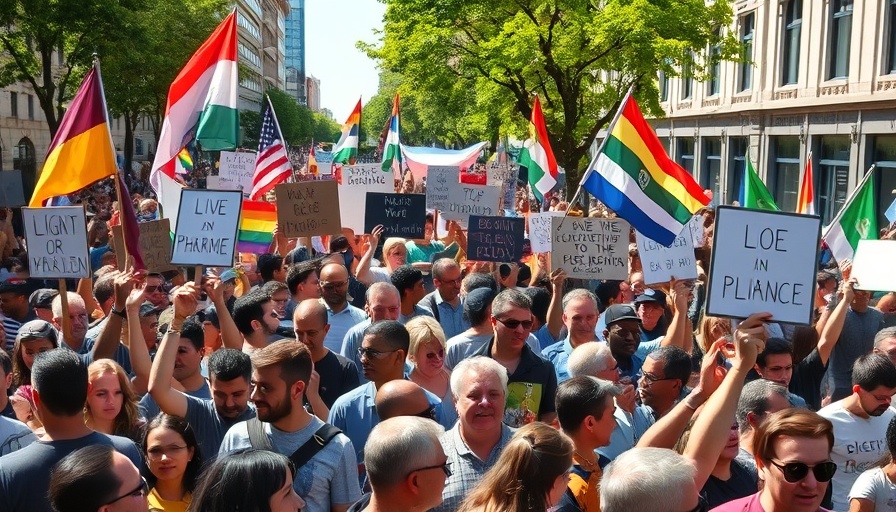
A Democratic Display of Dissent: Understanding the 'No Kings Day' Protests
On Saturday, Southern California witnessed an unprecedented outpouring of civic engagement as tens of thousands took to the streets for the 'No Kings Day' demonstrations. This significant event, driven by growing dissatisfaction with the Trump administration, particularly his aggressive immigration policies, found its crescendo outside Los Angeles City Hall, where demonstrators held aloft messages of patriotism and defiance.
More Than Just a Protest
The vibrant energy of the protests, spanning across locations from downtown Los Angeles to Pasadena, showcased a grassroots movement aimed at reclaiming the rights they felt were being stripped away. Participants, from all walks of life, gathered under makeshift banners adorned with crossed-out crowns, juxtaposed against the flags of the United States and its neighboring countries like Mexico and Guatemala. The sentiment that 'protest is patriotic' echoed through the crowds, reinforcing the idea that standing up against perceived injustices is at the very heart of American democracy.
The Human Stories Behind the Movement
Among the thousands was Michelle Verne, a passionate participant who poignantly expressed, “All of our rights are being violated.” Her remarks reflect the emotional weight of the ongoing immigration raids that have become a focal point of contention in California. The story of a local 9-year-old boy and his father being deported after a routine hearing has resonated deeply within the community, serving as a stark reminder of the personal stakes involved in immigration policy.
Gathering for a Common Cause
Despite the serious nature of their grievances, the atmosphere during the marches was festive. Participants engaged in moments of joy, such as when state Sen. Maria Elena Durazo joined in dancing with fellow protestors at Plaza Olvera. Such instances of connection and solidarity are vital, conveying to the community that while challenges abound, collective action can foster hope and resilience.
The Larger Picture: National Demonstrations
The protests were not isolated to California. Over 2,000 marches took place nationally, highlighting a wide array of concerns beyond immigration—touching on issues of human rights and government accountability. This nationwide movement illustrates a collective unease with the current political landscape, where many feel as though democracy is being tested and compromised.
Reclaiming Rights in the Face of Adversity
For residents in and around Bakersfield, California, these marches serve as a vital reminder of the power of collective action. Whether it's standing against immigration raids or helping to foster a more inclusive dialogue regarding rights and freedoms, these protests embody a formidable spirit of resilience. The demonstrations are an emotional and powerful reminder that activism is not just about voicing dissent, but about advocating for a brighter and more equitable future.
Moving Forward: Community Engagement and Action
As we reflect on these protests, it’s crucial for individuals in our communities to engage actively in discussions about civic rights and to seek positive change. From joining local advocacy groups to simply sharing stories like those seen during 'No Kings Day', every action contributes to a larger movement towards justice. This necessity for engagement stems not only from personal conviction but from a collective hope for a future where kindness and understanding guide policy.
The 'No Kings Day' protests in Los Angeles are emblematic of a broader struggle for rights and recognition. In a time when democracy feels precarious, the voices of the many will continue to resonate, reminding us that patriotism is rooted not in blind allegiance but in questioning and challenging the status quo.
 Add Row
Add Row  Add
Add 



Write A Comment